常见前缀与后缀 英语 附加习题及答案
- 格式:doc
- 大小:101.00 KB
- 文档页数:5
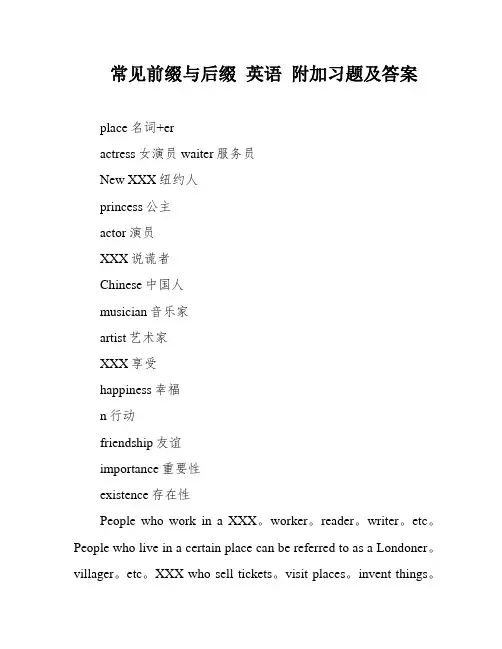
常见前缀与后缀英语附加习题及答案place名词+eractress女演员waiter服务员New XXX纽约人princess公主actor演员XXX说谎者Chinese中国人musician音乐家artist艺术家XXX享受happiness幸福n行动friendship友谊importance重要性existence存在性People who work in a XXX。
worker。
reader。
writer。
etc。
People who live in a certain place can be referred to as a Londoner。
villager。
etc。
XXX who sell tickets。
visit places。
invent things。
act。
or survive XXX as a conductor。
visitor。
inventor。
actor。
or survivor。
respectively。
People who edit or beg for a living can be XXX to as Chinese。
Japanese。
etc。
People who work inXXX as a musician。
physician。
scientist。
dentist。
etc。
People who hold XXX。
The state of being happy or ill can be XXX。
The state of being a XXX can also be formed by adding the suffix -ful。
XXX suffixes like -al。
-an。
-ern。
-able。
-ful。
-ish。
-ive。
-y。
-en。
-ous。
-ary。
-ic。
-some。
-like。
-ly。
or -less to certain root words。
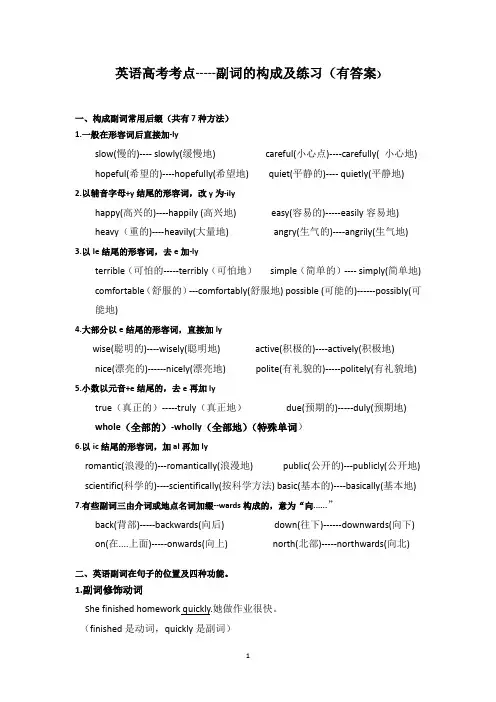
英语高考考点-----副词的构成及练习(有答案)一、构成副词常用后缀(共有7种方法)1.一般在形容词后直接加-lyslow(慢的)---- slowly(缓慢地) careful(小心点)----carefully( 小心地) hopeful(希望的)----hopefully(希望地) quiet(平静的)---- quietly(平静地)2.以辅音字母+y结尾的形容词,改y为-ilyhappy(高兴的)----happily (高兴地) easy(容易的)-----easily容易地)heavy(重的)----heavily(大量地) angry(生气的)----angrily(生气地) 3.以le结尾的形容词,去e加-lyterrible(可怕的-----terribly(可怕地)simple(简单的)---- simply(简单地) comfortable(舒服的)---comfortably(舒服地) possible (可能的)------possibly(可能地)4.大部分以e结尾的形容词,直接加lywise(聪明的)----wisely(聪明地) active(积极的)----actively(积极地)nice(漂亮的)------nicely(漂亮地) polite(有礼貌的)-----politely(有礼貌地) 5.小数以元音+e结尾的,去e再加lytrue(真正的)-----truly(真正地)due(预期的)-----duly(预期地)whole(全部的)-wholly(全部地)(特殊单词)6.以ic结尾的形容词,加al再加lyromantic(浪漫的)---romantically(浪漫地) public(公开的)---publicly(公开地) scientific(科学的)----scientifically(按科学方法) basic(基本的)----basically(基本地) 7.有些副词三由介词或地点名词加缀--wards构成的,意为“向......”back(背部)-----backwards(向后) down(往下)------downwards(向下) on(在....上面)-----onwards(向上) north(北部)-----northwards(向北)二、英语副词在句子的位置及四种功能。
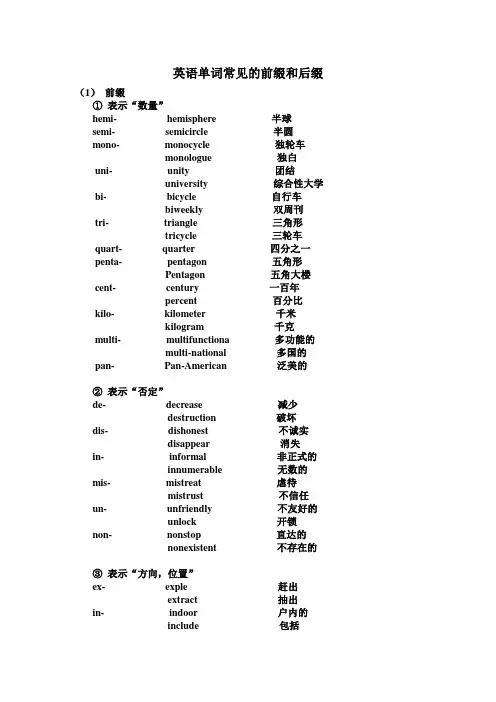
英语单词常见的前缀和后缀(1)前缀①表示“数量”hemi- hemisphere 半球semi- semicircle 半圆mono- monocycle 独轮车monologue 独白uni- unity 团结university 综合性大学bi- bicycle 自行车biweekly 双周刊tri- triangle 三角形tricycle 三轮车quart- quarter 四分之一penta- pentagon 五角形Pentagon 五角大楼cent- century 一百年percent 百分比kilo- kilometer 千米kilogram 千克multi- multifunctiona 多功能的multi-national 多国的pan- Pan-American 泛美的②表示“否定”de- decrease 减少destruction 破坏dis- dishonest 不诚实disappear 消失in- informal 非正式的innumerable 无数的mis- mistreat 虐待mistrust 不信任un- unfriendly 不友好的unlock 开锁non- nonstop 直达的nonexistent 不存在的③表示“方向,位置”ex- exple 赶出extract 抽出in- indoor 户内的include 包括inter- interview 会见interact 互相作用pro- propel 推进protrude 向前伸出sub- subway 地下铁道submarine 潜艇trans- transatlantic 横穿大西洋的transform 变革④表示“程度”extra(o)- extraordinary 非常的extracurricular 课外的mini- minibus 小面包车miniskirt 短裙out- outnumber 数量超过outlive 活得更长over- overwork 过度劳累overcharge 要价过高super- supersonic 超音速supermarket 超级市场under- underestimate 低估underdeveloped 不发达的⑤表示“时间先后”ex- ex-premier 前总理ex-husband 前夫fore- forehead 前额foresee 预见mid- midday 正午midterm 期中pre- precaution 预防措施prefix 前缀post- postpone 推迟postwar 战后⑥表示“方式”anti- antinuclear 反核antiaircraft 防空co- coexist 共存colleague 同事col- collaborate 合作collocate 并置com- compassion 同情combine 联合con- connect 连接contract 合同counter- counterattack 反攻counteract 抵消re- reunite 重新联合rebuild 重建⑦加在名词或形容词前使其变为动词,表示“使…”en- enable 使…能够endanger 使危险(2)后缀1)常见的名词后缀①表示“做某事的人或物”-ar scholar 学者liar 说谎的人-ari humanitarian 人道主义者vegetarian 素食者-er worker 工人wirter 作家-or sailor 水手educator 教育家-eer mountaineer 登山者engineer 工程师-man statesman 政治家artist 艺术家-ian technician 技术员historian 历史学家-ant inhabitant 居民participant 参加者-ent resident 居民president 总统②表示“场所”-ory dormitory 集体宿舍laboratory 实验室-ary liborary 图书馆depositary 存放处③表示“学科”-ics economics 经济学electronics 电子学-logy biology 生物学methodology 方法论④表示“抽象名词”-al removal 移动survival 幸存-ance appearance 出现assistance 援助-ence existence 存在difference 区别-hood manhood 成年likelihood 可能性-ion translation 翻译possession 拥有-ment agreement 同意development 发展-ness bitterness 苦难kindness 仁慈-ship hardship 苦难scholarship 奖学金-sure exposure 暴露pleasure乐趣-th growth 成长depth 深度-ty safety 安全loyalty 忠诚2}常见的形容词后缀①表示“充满”、“多”-ful faithful 忠诚的meaningful 有意义的-ous prosperous 繁荣的courageous 有勇气的-y sleepy 想睡的bloody 流血的②表示“类似”-ish childish 幼稚的boyish 像男孩一样的-like childlike 孩子样的homelike 亲切的-ly manly 有男子气概的friendly 友好的-some troublesome 令人烦恼的fearsome 可怕的③表示“具有…性质的”-al vital 重要的governmental 政府的-ant vigilant 警惕的resistant 抵抗的-ar particular 特别的familiar 熟悉的-ary secondary 次要的customary 习惯的-ent insistent 坚持的confident 自信的-ial beneficial 友谊处的facial 面部的-ic historic 有历史意义的electronic 电子的-ory contradictory 矛盾的compulsory 强制性的④表示“主、被动意义”-able practicable 可行的dependable 可靠的-ible credible 可信的perceptible 可察觉的-ive protective 保护的instructive 有教育意义的⑤表示“由…制成的”-en wooden 木制的woolen 羊毛制的⑥表示“方向”-ern southern 南方的estern 东方的⑦表示“否定”-less careless 粗心的speechless 无语的sleepless 不眠的3)常见的动词性后缀表示“使成为¨”-ate artivate 使活跃concentrate 集中-en strengthen 加强deepen 加深-fy magnify 使放大classify 分类-ize modernize 使现代化materialize 使具体化4)常见的副词后缀“变形容词或名词为副词”-ly quickly 快速地carefully 细心地-ward forward 向前eastward 响东-wise clockwise 顺时针方向otherwise 否则。
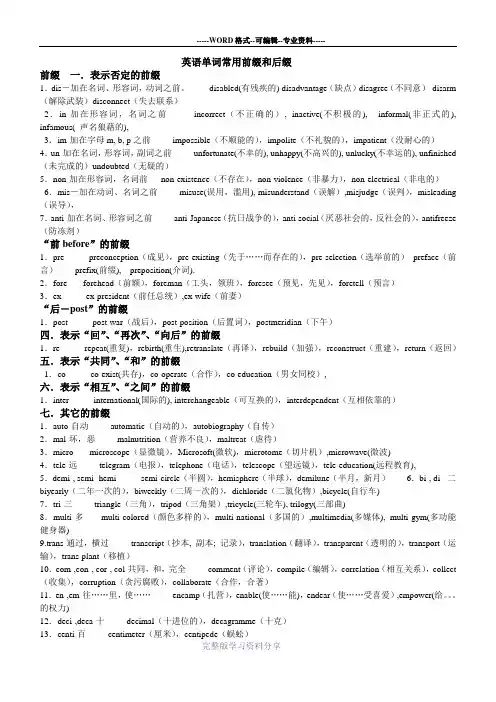
英语单词常用前缀和后缀前缀一.表示否定的前缀1.dis-加在名词、形容词,动词之前。
disabled(有残疾的) disadvantage(缺点)disagree(不同意)disarm (解除武装)disconnect(失去联系)2.in-加在形容词,名词之前incorrect(不正确的), inactive(不积极的), informal(非正式的), infamous( 声名狼藉的),3.im-加在字母m, b, p之前impossible(不顺能的),impolite(不礼貌的),impatient(没耐心的)4.un-加在名词,形容词,副词之前unfortunate(不幸的), unhappy(不高兴的), unlucky(不幸运的), unfinished (未完成的)undoubted(无疑的)5.non-加在形容词,名词前non-existence(不存在),non-violence(非暴力),non-electrical(非电的)6.mis-加在动词、名词之前misuse(误用,滥用), misunderstand(误解),misjudge(误判),misleading (误导),7.anti-加在名词、形容词之前anti-Japanese(抗日战争的),anti-social(厌恶社会的,反社会的),antifreeze (防冻剂)“前before”的前缀1.pre- preconception(成见),pre-existing(先于……而存在的),pre-selection(选举前的)preface(前言)prefix(前缀), preposition(介词).2.fore- forehead(前额),foreman(工头,领班),foresee(预见,先见),foretell(预言)3.ex- ex-president(前任总统),ex-wife(前妻)“后-post”的前缀1.post- post-war(战后),post-position(后置词),postmeridian(下午)四.表示“回”、“再次”、“向后”的前缀1.re- repeat(重复),rebirth(重生),retranslate(再译),rebuild(加强),reconstruct(重建),return(返回)五.表示“共同”、“和”的前缀1.co- co-exist(共存),co-operate(合作),co-education(男女同校),六.表示“相互”、“之间”的前缀1.inter- international(国际的), interchangeable(可互换的),interdependent(互相依靠的)七.其它的前缀1.auto-自动automatic(自动的),autobiography(自传)2.mal-坏,恶malnutrition(营养不良),maltreat(虐待)3.micro- microscope(显微镜),Microsoft(微软),microtome(切片机),microwave(微波)4.tele-远telegram(电报),telephone(电话),telescope(望远镜),tele-education(远程教育),5.demi-, semi- hemi- semi-circle(半圆),hemisphere(半球),demilune(半月,新月)6.bi-, di- 二biyearly(二年一次的),biweekly(二周一次的),dichloride(二氯化物),bicycle(自行车)7.tri-三triangle(三角),tripod(三角架),tricycle(三轮车), trilogy(三部曲)8.multi-多multi-colored(颜色多样的),multi-national(多国的),multimedia(多媒体), multi-gym(多功能健身器)9.trans-通过,横过transcript(抄本, 副本; 记录),translation(翻译),transparent(透明的),transport(运输),trans-plant(移植)10.com-,con-, cor-, col-共同,和,完全comment(评论),compile(编辑),correlation(相互关系),collect (收集),corruption(贪污腐败),collaborate(合作,合著)11.en-,em-往……里,使……encamp(扎营),enable(使……能),endear(使……受喜爱),empower(给。
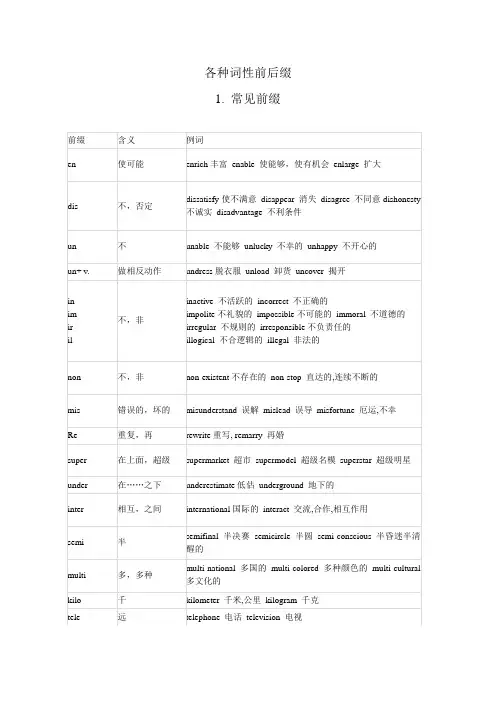
各种词性前后缀1. 常见前缀2. 名词后缀3 . 形容词后缀4. 动词后缀5. 副词后缀-ly是最常见的副词后缀, 可以附加在形容词后,构成与原形容词意义相同的副词。
如:slowly 缓慢地happily高兴地truly 真实地wholly 全部地simply 纯粹地练习1. 动词、介词、冠词、物主代词等词后一般接名词或动名词, 如果所给单词是其它词类, 就要将其改为名词, 并注意名词数的变化。
(1)Do you know the ______ (deep) of the river?(2)His _____ (careful) resulted in the terrible accident(3)He is one of the ______ (science) who support this theory.答案:(1) depth (2) carelessness (3) scientists2. 动词、介词后一般接名词或动名词, 如果所给单词为动词,就要看该动词是否有名词形式,如果有名词形式,就用其名词形式;如果该动词没有名词形式,就用其动名词。
如:(1)Please pay ________ (attend) to your handwriting.(2) His _______ (arrive) made the situation worse.(3)The teacher was angry at my _________ (come) late.答案:(1) attention (2) arrival (3) coming3. 动词前后、形容词前后可有副词。
如果所需词为副词时, 还要考虑副词级的变化。
如:(1)The boy ran ______ (quick) to school.(2)“What’s that?”Father shouted ______ (angry).(3)The little girl is ______(extreme)eager to know the result of the exam。
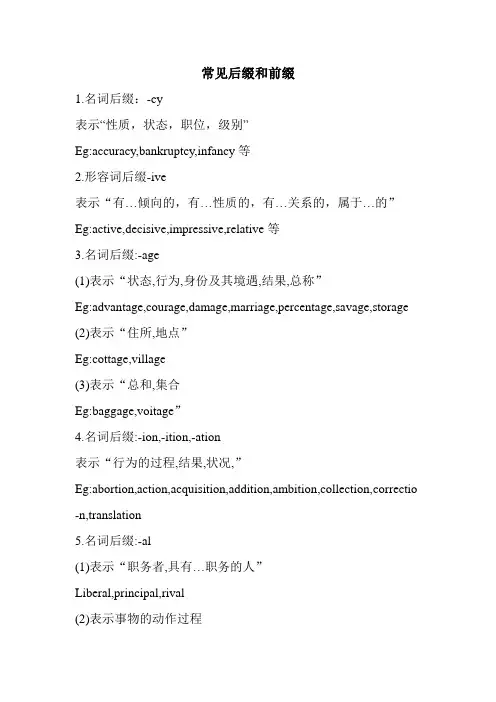
常见后缀和前缀1.名词后缀:-cy表示“性质,状态,职位,级别”Eg:accuracy,bankruptcy,infancy等2.形容词后缀-ive表示“有…倾向的,有…性质的,有…关系的,属于…的”Eg:active,decisive,impressive,relative等3.名词后缀:-age(1)表示“状态,行为,身份及其境遇,结果,总称”Eg:advantage,courage,damage,marriage,percentage,savage,storage (2)表示“住所,地点”Eg:cottage,village(3)表示“总和,集合Eg:baggage,voitage”4.名词后缀:-ion,-ition,-ation表示“行为的过程,结果,状况,”Eg:abortion,action,acquisition,addition,ambition,collection,correctio -n,translation5.名词后缀:-al(1)表示“职务者,具有…职务的人”Liberal,principal,rival(2)表示事物的动作过程Eg:appeal,approval,arrival,burial,refusal (3)表示具体的事物Eg:annual,cathedral,coral,criminal(4)表示“属于…的,与…有关的”Eg:additional,educational,natural,vital6.名词后缀:-ance,-ence表示“性质,状况,行为,过程,总量,程度”Eg:advance,apperarance,importance,difference 7.前缀:auto-表示“自己(做)的”Eg:automatic,automobile,autonomous8.形容词后缀:-ward表示“向…的”Eg:backward,downward,forward9.形容词后缀:-ful表示“充满或引起…的”Eg:beautiful,careful,fearful,hopeful,wonderful 10.前缀:bi-表示“二,双,两倍的”Eg:bicycle,biparty11.前缀:bio-表示“生命,生物”Eg:biochemistry,biography,biology12.名词后缀:-ate(1)表示“具有…职责的人,恶作剧的人”Eg:candidate,graduate(2)表示“住所,馆会”Eg:consulate,senate(3)表示“...状的,…形的”Eg:ovate(4)表示“成为…,使化合,处理,使,作用”Eg”accelerate,accumulate,associate,calcuiate,celebrate,circuiate,com -municate,operate13.名词后缀:-er,-ar,-or表示“从事某种职业的人”Eg:astronomer,carpenter,carrier,cleaner,acter,ambassador,author,scho -iar。
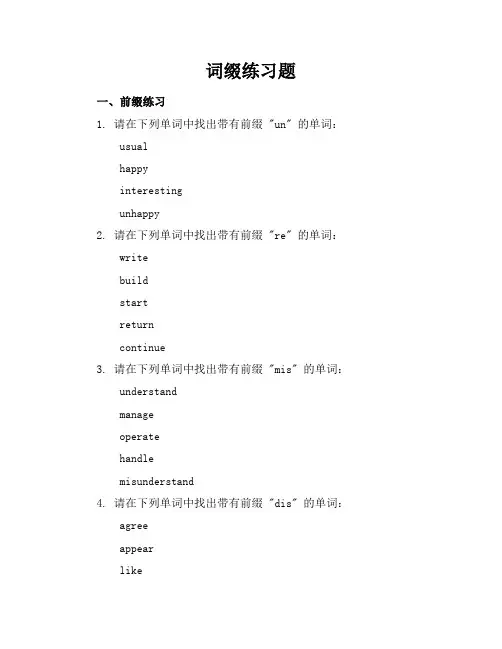
词缀练习题一、前缀练习1. 请在下列单词中找出带有前缀 "un" 的单词: usualhappyinterestingunhappy2. 请在下列单词中找出带有前缀 "re" 的单词: writebuildstartreturncontinue3. 请在下列单词中找出带有前缀 "mis" 的单词: understandmanageoperatehandlemisunderstand4. 请在下列单词中找出带有前缀 "dis" 的单词: agreeappearlikedisagree5. 请在下列单词中找出带有前缀 "pre" 的单词: pareviewpareventpare二、后缀练习1. 请在下列单词中找出带有后缀 "ness" 的单词: happysadnesslonelinessgreatnesshealthiness2. 请在下列单词中找出带有后缀 "ful" 的单词: carefulhelpfulharmfulusefuljoyful3. 请在下列单词中找出带有后缀 "less" 的单词: hopefearlessmercilesspowerless4. 请在下列单词中找出带有后缀 "ment" 的单词:developmentagreementimprovementgovernmentemployment5. 请在下列单词中找出带有后缀 "er" 或 "or" 的单词:teacheractordriverpainterdancer三、复合词缀练习1. 请在下列单词中找出带有复合词缀 "un" 和 "ness" 的单词: happinessunhappinesslonelinessunhealthinessgreatness2. 请在下列单词中找出带有复合词缀 "re" 和 "ify" 的单词: identifyclarifysimplifymodify3. 请在下列单词中找出带有复合词缀 "pre" 和 "dict" 的单词:predictcontradictoverrideundervaluemisrepresent4. 请在下列单词中找出带有复合词缀 "inter" 和 "change" 的单词:exchangeinterchangeinteractinterrelate5. 请在下列单词中找出带有复合词缀 "de" 和 "ify" 的单词:definedeifydegradedemocratizedecentralize四、词根与词缀结合练习1. 请根据给出的词根和词缀,构造一个完整的单词:词根:spect,词缀:ive词根:form,词缀:ation词根:struct,词缀:ure词根:port,词缀:able词根:grad,词缀:ual2. 请根据给出的词根和词缀,构造一个完整的单词,并判断其词性:词根:bio,词缀:graphy词根:geo,词缀:ology词根:aqua,词缀:tic词根:chrono,词缀:logical词根:hydro,词缀:scope3. 请根据给出的词根和词缀,构造一个完整的单词,并选择正确的同义词:词根:tele,词缀:graph同义词选项:A. photograph B. radiograph C. holograph D. seismograph词根:audio,词缀:phone同义词选项:A. telephone B. microphone C. phonograph D. megaphone词根:photo,词缀:graphy同义词选项:A. cinematography B. photography C. holography D. cartography词根:magneto,词缀:meter同义词选项:A. barometer B. thermometer C. hydrometer D. magnetometer词根:electro,词缀:scope同义词选项:A. oscilloscope B. telescope C. microscope D. kaleidoscope五、词缀识别与转换练习1. 请将下列单词中的词缀转换为对应的反义词缀,并写出新的单词:happy (变为不快乐的)responsible (变为不负责任的)active (变为不活跃的)efficient (变为低效的)2. 请将下列单词中的词缀转换为对应的名词后缀,并写出新的单词:improve (变为名词)decide (变为名词)inform (变为名词)remember (变为名词)understand (变为名词)3. 请将下列单词中的词缀转换为对应的形容词后缀,并写出新的单词:nation (变为形容词)science (变为形容词)culture (变为形容词)economy (变为形容词)society (变为形容词)六、词缀填空练习1. 请根据句子意思,选择合适的词缀填空:The __________ (use) of the new software has significantly improved our workflow.The __________ (nation) of the region is diverse, with people from many different countries.The __________ (research) team has made a breakthrough in the field of genetics.The __________ (organize) of the event was flawless, with everything running smoothly.The __________ (create) of the new character for the movie was a challenging task.2. 请根据句子意思,选择合适的词缀填空:The __________ (beauty) of the landscape is breathtaking, with its vibrant colors and serene atmosphere.The __________ (happy) of the children playing in the park was infectious.The __________ (health) of the population has improved due to better healthcare services.The __________ (power) of the new engine is impressive, providing excellent performance.The __________ (truth) of the statement was evident to everyone who heard it.七、词缀搭配练习1. 请根据给出的词缀,选择合适的词根搭配,构成意义合理的单词:词缀:ableA. readB. hopeC. playD. think词缀:lessA. hopeB. peaceC. joyD. harm词缀:fulA. careB. harmC. useD. time词缀:mentA. decideB. moveC. thinkD. change词缀:ousA. dangerB. hopeC. fearD. love2. 请根据给出的词根,选择合适的词缀搭配,构成意义合理的单词:词根:spectA. iveB. ionC. orD. ful词根:formA. ationB. alC. lessD. ify词根:structA. ureB. iveC. ionD. or词根:portA. ableB. ageC. mentD. ful词根:gradA. ualB. ationC. iveD. less八、词缀与词义匹配练习1. 请将下列词缀与相应的词义匹配:词缀:un A. 表示“下面” B. 表示“再次” C. 表示“相反” D. 表示“不是”词缀:re A. 表示“下面” B. 表示“再次” C. 表示“相反” D. 表示“不是”词缀:mis A. 表示“下面” B. 表示“再次” C. 表示“错误” D. 表示“不是”词缀:dis A. 表示“下面” B. 表示“相反” C. 表示“错误” D. 表示“不是”2. 请将下列词缀与相应的词义匹配:词缀:ness A. 表示“状态” B. 表示“能力” C. 表示“动作” D. 表示“地点”词缀:ful A. 表示“状态” B. 表示“能力” C. 表示“充满” D. 表示“地点”词缀:less A. 表示“状态” B. 表示“没有” C. 表示“动作” D. 表示“地点”词缀:ment A. 表示“状态” B. 表示“结果” C. 表示“动作” D. 表示“地点”九、词缀应用练习1. 请用适当的词缀将下列单词转换为不同的词性:happy (形容词变为名词)run (动词变为名词)beautiful (形容词变为副词)decide (动词变为名词)strong (形容词变为名词)2. 请用适当的词缀将下列单词转换为反义词:honest (变为不诚实的)responsible (变为不负责任的)active (变为不活跃的)patient (变为不耐心的)十、词缀创意构造练习词根:aqua,词缀:phobic词根:chrono,词缀:scope词根:geo,词缀:mancer词根:hydro,词缀:static词根:pyro,词缀:mania词根:bi,词缀:centric词根:cyber,词缀:naut词根:eco,词缀:cide词根:neo,词缀:lith词根:poly,词缀:glot十一、词缀识别与分类练习1. 请从下列单词中选出带有前缀的单词,并将其分类为相应的词缀类别:2. 请从下列单词中选出带有后缀的单词,并将其分类为相应的词缀类别:activity, beautiful, carelessness, dependability, determination, effectiveness, friendliness, happiness, imagination, intelligence, kindness, leadership, necessitate, organization, responsibility, similarity, thickness, understanding, willingness.十二、词缀变换练习1. 请将下列单词中的前缀或后缀替换为另一组前缀或后缀,并写出新的单词:unhappy (变为快乐的) →disagree (变为同意) →underestimate (变为高估) →disapprove (变为批准) →uninterested (变为感兴趣的) →2. 请将下列单词中的后缀替换为另一组后缀,并写出新的单词:happiness (变为形容词) →efficiency (变为动词) →hesitate (变为名词) →impress (变为形容词) →十三、词缀填空与应用练习1. 请根据句子意思,选择合适的词缀填空:The __________ (ignore) of the warning signs led to a serious accident.The __________ (support) for the candidate grew steadily throughout the campaign.The __________ (deviate) from the original plan caused confusion among the team members.2. 请根据句子意思,选择合适的词缀填空:The __________ (beauty) of the sunset was a sight to behold.The __________ (doubt) about the authenticity of the document was reasonable.The __________ (ignore) of the rules resulted in a penalty for the player.The __________ (recognize) of the employee's achievements was welldeserved.十四、词缀与词义联想练习1. 请根据给出的词缀,写出至少三个与之相关的单词,并简要说明它们的意义:词缀:bio词缀:geo词缀:hydro词缀:aero词缀:chrono2. 请根据给出的词缀,写出至少三个与之相关的单词,并简要说明它们的意义:词缀:phobia词缀:mania词缀:scope词缀:graph词缀:meter十五、词缀与语境匹配练习1. 请根据句子语境,选择合适的带有词缀的单词填空:The __________ (evidence) presented in court was convincing enough to secure a conviction.The __________ (impact) of the new technology on the industry was profound.The __________ (solution) to the problem was innovative and effective.2. 请根据句子语境,选择合适的带有词缀的单词填空:The __________ (accuracy) of the weather forecast was praised the public.The __________ (duration) of the meeting was longer than expected.The __________ (intensity) of the exercise program was adjusted to suit different fitness levels.The __________ (quality) of the product exceeded customer expectations.答案:七、词缀搭配练习1. 请根据给出的词缀,选择合适的词根搭配,构成意义合理的单词:词缀:able: A. readable词缀:less: B. hopelessness词缀:ful: C. careful词缀:ment: D. decision词缀:ous: A. dangerous2. 请根据给出的词根,选择合适的词缀搭配,构成意义合理的单词:词根:spect: A. spectacular词根:form: B. formation词根:struct: C. structure词根:port: D. portable词根:grad: E. gradual八、词缀与词义匹配练习1. 请将下列词缀与相应的词义匹配:词缀:un: D. 表示“不是”词缀:re: B. 表示“再次”词缀:mis: C. 表示“错误”词缀:dis: B. 表示“相反”2. 请将下列词缀与相应的词义匹配:词缀:ness: A. 表示“状态”词缀:ful: C. 表示“充满”词缀:less: B. 表示“没有”词缀:ment: B. 表示“结果”九、词缀应用练习1. 请用适当的词缀将下列单词转换为不同的词性:happy: happinessrun: runnerbeautiful: beautifullydecide: decisionstrong: strength2. 请用适当的词缀将下列单词转换为反义词:kind: unkindhonest: dishonestresponsible: irresponsibleactive: inactivepatient: impatient十、词缀创意构造练习词根:aqua,词缀:phobic: aquaphobic (害怕水的)词根:chrono,词缀:scope: chronoscope (时间观察器)词根:geo,词缀:mancer: geomancer (地球占卜师)词根:hydro,词缀:static: hydrostatic (静水力的)词根:pyro,词缀:mania: pyromania (纵火狂)词根:bi,词缀:centric: bicentric (有两个中心的)词根:cyber,词缀:naut: cybernaut (网络宇航员)词根:eco,词缀:cide: ecocide (生态灭绝)词根:neo,词缀:lith: neolith (新石器)词根:poly,词缀:glot: polyglot (多语种的)十一、词缀识别与分类练习1. 请从下列单词中选出带有前缀的单词,并将其分类为相应的词缀类别:前缀:un: disapprove, unhappy, underestimate前缀:re: anticipate, participate, resemble前缀:mis: hesitate, misestimate前缀:over: overestimate前缀:sub: subtract2. 请从下列单词中选出带有后缀的单词,并将其分类为相应的词缀类别:后缀:ness: happiness, carelessness, determination后缀:ful: beautiful, friendliness, leadership后缀:ability: activity, dependability, effectiveness后缀:ity: intelligence, kindness, similarity后缀:ment: organization, responsibility, adjustment 十二、词缀变换练习1. 请将下列单词中的前缀或后缀替换为另一组前缀或后缀,并写出新的单词:unhappy: happydisagree: agreeunderestimate: overestimatedisapprove: approveuninterested: interested2. 请将下列单词中的后缀替换为另一组后缀,并写出新的单词: happiness: happyefficiency: efficienthesitate: hesitationimpress: impressive十三、词缀填空与应用练习1. 请根据句子意思,选择合适的词缀填空:。
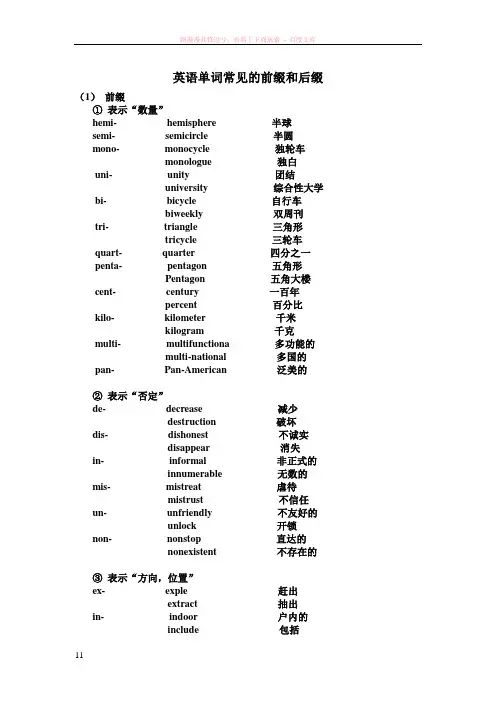
英语单词常见的前缀和后缀(1)前缀①表示“数量”hemi- hemisphere 半球semi- semicircle 半圆mono- monocycle 独轮车monologue 独白uni- unity 团结university 综合性大学bi- bicycle 自行车biweekly 双周刊tri- triangle 三角形tricycle 三轮车quart- quarter 四分之一penta- pentagon 五角形Pentagon 五角大楼cent- century 一百年percent 百分比kilo- kilometer 千米kilogram 千克multi- multifunctiona 多功能的multi-national 多国的pan- Pan-American 泛美的②表示“否定”de- decrease 减少destruction 破坏dis- dishonest 不诚实disappear 消失in- informal 非正式的innumerable 无数的mis- mistreat 虐待mistrust 不信任un- unfriendly 不友好的unlock 开锁non- nonstop 直达的nonexistent 不存在的③表示“方向,位置”ex- exple 赶出extract 抽出in- indoor 户内的include 包括inter- interview 会见interact 互相作用pro- propel 推进protrude 向前伸出sub- subway 地下铁道submarine 潜艇trans- transatlantic 横穿大西洋的transform 变革④表示“程度”extra(o)- extraordinary 非常的extracurricular 课外的mini- minibus 小面包车miniskirt 短裙out- outnumber 数量超过outlive 活得更长over- overwork 过度劳累overcharge 要价过高super- supersonic 超音速supermarket 超级市场under- underestimate 低估underdeveloped 不发达的⑤表示“时间先后”ex- ex-premier 前总理ex-husband 前夫fore- forehead 前额foresee 预见mid- midday 正午midterm 期中pre- precaution 预防措施prefix 前缀post- postpone 推迟postwar 战后⑥表示“方式”anti- antinuclear 反核antiaircraft 防空co- coexist 共存colleague 同事col- collaborate 合作collocate 并置com- compassion 同情combine 联合con- connect 连接contract 合同counter- counterattack 反攻counteract 抵消re- reunite 重新联合rebuild 重建⑦加在名词或形容词前使其变为动词,表示“使…”en- enable 使…能够endanger 使危险(2)后缀1)常见的名词后缀①表示“做某事的人或物”-ar scholar 学者liar 说谎的人-ari humanitarian 人道主义者vegetarian 素食者-er worker 工人wirter 作家-or sailor 水手educator 教育家-eer mountaineer 登山者engineer 工程师-man statesman 政治家artist 艺术家-ian technician 技术员historian 历史学家-ant inhabitant 居民participant 参加者-ent resident 居民president 总统②表示“场所”-ory dormitory 集体宿舍laboratory 实验室-ary liborary 图书馆depositary 存放处③表示“学科”-ics economics 经济学electronics 电子学-logy biology 生物学methodology 方法论④表示“抽象名词”-al removal 移动survival 幸存-ance appearance 出现assistance 援助-ence existence 存在difference 区别-hood manhood 成年likelihood 可能性-ion translation 翻译possession 拥有-ment agreement 同意development 发展-ness bitterness 苦难kindness 仁慈-ship hardship 苦难scholarship 奖学金-sure exposure 暴露pleasure 乐趣-th growth 成长depth 深度-ty safety 安全loyalty 忠诚2}常见的形容词后缀①表示“充满”、“多”-ful faithful 忠诚的meaningful 有意义的-ous prosperous 繁荣的courageous 有勇气的-y sleepy 想睡的bloody 流血的②表示“类似”-ish childish 幼稚的boyish 像男孩一样的-like childlike 孩子样的homelike 亲切的-ly manly 有男子气概的friendly 友好的-some troublesome 令人烦恼的fearsome 可怕的③表示“具有…性质的”-al vital 重要的governmental 政府的-ant vigilant 警惕的resistant 抵抗的-ar particular 特别的familiar 熟悉的-ary secondary 次要的customary 习惯的-ent insistent 坚持的confident 自信的-ial beneficial 友谊处的facial 面部的-ic historic 有历史意义的electronic 电子的-ory contradictory 矛盾的compulsory 强制性的④表示“主、被动意义”-able practicable 可行的dependable 可靠的-ible credible 可信的perceptible 可察觉的-ive protective 保护的instructive 有教育意义的⑤表示“由…制成的”-en wooden 木制的woolen 羊毛制的⑥表示“方向”-ern southern 南方的estern 东方的⑦表示“否定”-less careless 粗心的speechless 无语的sleepless 不眠的3)常见的动词性后缀表示“使成为¨”-ate artivate 使活跃concentrate 集中-en strengthen 加强deepen 加深-fy magnify 使放大classify 分类-ize modernize 使现代化materialize 使具体化4)常见的副词后缀“变形容词或名词为副词”-ly quickly 快速地carefully 细心地-ward forward 向前eastward 响东-wise clockwise 顺时针方向otherwise 否则。
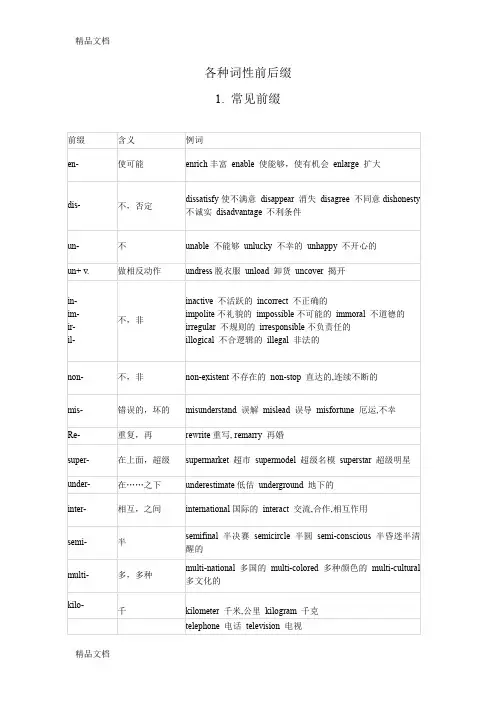
各种词性前后缀1. 常见前缀2. 名词后缀3 . 形容词后缀4. 动词后缀5. 副词后缀-ly是最常见的副词后缀, 可以附加在形容词后,构成与原形容词意义相同的副词。
如:slowly 缓慢地happily高兴地truly 真实地wholly 全部地simply 纯粹地练习1. 动词、介词、冠词、物主代词等词后一般接名词或动名词, 如果所给单词是其它词类, 就要将其改为名词, 并注意名词数的变化。
(1)Do you know the ______ (deep) of the river?(2)His _____ (careful) resulted in the terrible accident(3)He is one of the ______ (science) who support this theory.答案:(1) depth (2) carelessness (3) scientists2. 动词、介词后一般接名词或动名词, 如果所给单词为动词,就要看该动词是否有名词形式,如果有名词形式,就用其名词形式;如果该动词没有名词形式,就用其动名词。
如:(1)Please pay ________ (attend) to your handwriting.(2) His _______ (arrive) made the situation worse.(3)The teacher was angry at my _________ (come) late.答案:(1) attention (2) arrival (3) coming3. 动词前后、形容词前后可有副词。
如果所需词为副词时, 还要考虑副词级的变化。
如:(1)The boy ran ______ (quick) to school.(2)“What’s that?”Father shouted ______ (angry).(3)The little girl is ______(extreme)eager to know the result of the exam。
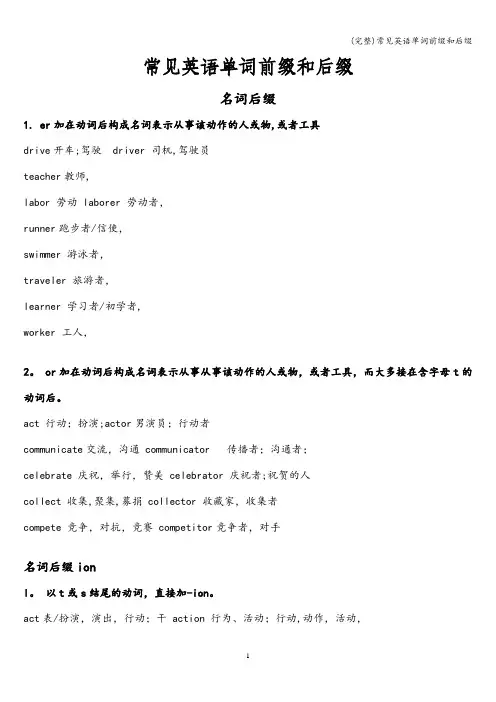
常见英语单词前缀和后缀名词后缀1. er加在动词后构成名词表示从事该动作的人或物,或者工具drive开车;驾驶driver 司机,驾驶员teacher教师,labor 劳动 laborer 劳动者,runner跑步者/信使,swimmer 游泳者,traveler 旅游者,learner 学习者/初学者,worker 工人,2。
or加在动词后构成名词表示从事从事该动作的人或物,或者工具,而大多接在含字母t的动词后。
act 行动;扮演;actor男演员;行动者communicate交流,沟通 communicator 传播者;沟通者;celebrate 庆祝,举行,赞美 celebrator 庆祝者;祝贺的人collect 收集,聚集,募捐 collector 收藏家,收集者compete 竞争,对抗,竞赛 competitor竞争者,对手名词后缀ionI。
以t或s结尾的动词,直接加-ion。
act表/扮演,演出,行动;干 action 行为、活动;行动,动作,活动,collect 收集,聚集,募捐 collection 收藏,收藏品,募捐conduct 管理;引导;处理、传导 conduction 传导connect 连接,与…有联系 connection 连接;关系;连接件construct 建造,构造;创立 construction 建筑;建设;建筑物II。
以te结尾的动词,须去掉e,再加上-ion。
appreciate 欣赏;感激appreciation欣赏,鉴别;感谢celebrate庆祝,举行,赞美 celebration庆典,庆祝,颂扬communicate交流,沟通 communication 交流,沟通;交际,交往,通讯create 创造, 造成creation 创造,创作,创作物III。
以d或de结尾的动词,先改d或de为s,再加—ion。
conclude 推断、终止 conclusion 总结decide 决定 decision 决定extend 延伸 extension 延伸persuade 劝说 persuasion 说服但:attend(注意)-attention(注意、专心)例外。
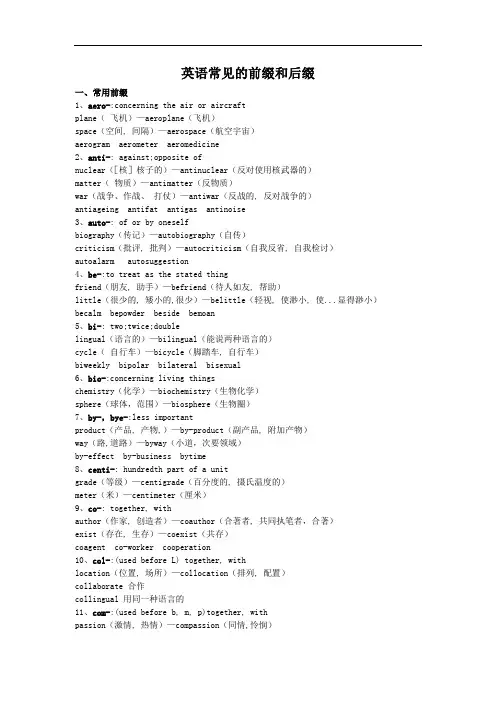
英语常见的前缀和后缀一、常用前缀1、aero-:concerning the air or aircraftplane(飞机)—aeroplane(飞机)space(空间, 间隔)—aerospace(航空宇宙)aerogram aerometer aeromedicine2、anti-: against;opposite ofnuclear([核]核子的)—antinuclear(反对使用核武器的)matter(物质)—antimatter(反物质)war(战争、作战、打仗)—antiwar(反战的, 反对战争的)antiageing antifat antigas antinoise3、auto-: of or by oneselfbiography(传记)—autobiography(自传)criticism(批评, 批判)—autocriticism(自我反省, 自我检讨)autoalarm autosuggestion4、be-:to treat as the stated thingfriend(朋友, 助手)—befriend(待人如友, 帮助)little(很少的, 矮小的,很少)—belittle(轻视, 使渺小, 使...显得渺小)becalm bepowder beside bemoan5、bi-: two;twice;doublelingual(语言的)—bilingual(能说两种语言的)cycle(自行车)—bicycle(脚踏车, 自行车)biweekly bipolar bilateral bisexual6、bio-:concerning living thingschemistry(化学)—biochemistry(生物化学)sphere(球体,范围)—biosphere(生物圈)7、by-,bye-:less importantproduct(产品, 产物,)—by-product(副产品, 附加产物)way(路,道路)—byway(小道,次要领域)by-effect by-business bytime8、centi-: hundredth part of a unitgrade(等级)—centigrade(百分度的, 摄氏温度的)meter(米)—centimeter(厘米)9、co-: together, withauthor(作家, 创造者)—coauthor(合著者, 共同执笔者,合著)exist(存在, 生存)—coexist(共存)coagent co-worker cooperation10、col-:(used before L) together, withlocation(位置, 场所)—collocation(排列, 配置)collaborate 合作collingual 用同一种语言的11、com-:(used before b, m, p)together, withpassion(激情, 热情)—compassion(同情,怜悯)battle (战役)-combat (战斗)combine compress compatriot12、con-:together, withcentric(中心的, 中央的)—concentric(同中心的)federation(同盟, 联邦, 联合, 联盟)—confederation(联邦)conclude confirm conjoin contribute13、contra-:oppositediction(措辞, 用语, 言语)—contradiction(反驳, 矛盾)natural(自然的, 自然界的)—contranatural(违背自然的)contra-missile contraclockwise14、cor-:(used before r) together, withrelate(叙述, 讲, 使联系, 发生关系)—correlate(使相互关联,和...相关)respond(回答, 响应, 作出反应,有反应)—correspond(符合, 协调, 通信, 相当, 相应)correct corrupt corrival15、counter-:oppositeact(担当,表现, 见效)—counteract(抵消, 中和, 阻碍)attack(攻击)—counterattack(反引力)counter—terrorist countereffect16、cross-:across;going between the stated things and joining themcountry(乡下的, 乡村的)—crosscountry(越野地, 横过田野的)breed((使)繁殖, 教养, 抚养,品种, 种类)—crossbreed([生物]杂种,异种交配, 培育杂种, (使)杂交)17、de-:showing an opposite; to remove; to reducecode(代码, 密码)—decode(解码, 译解)value(评价, 重视)—devalue((=devaluate)减值, 贬值)decline increase decrease18、dis-:not; the opposite ofadvantage(优势, 有利条件)—disadvantage(不利, 不利条件, 缺点, 劣势)agree(同意)—disagree(不一致, 不适宜)honest(诚实的, 正直的)—dishonest(不诚实的)disorder discourage dispart distract19、em-:(used before b, m, p) to cause to becomebody(赋以形体)—embody(具体表达, 使具体化)power(权力,激励)—empower(授权与, 使能够)embed embar embow embitter20、en-:to cause to become; to makedanger(威胁)—endanger(危及)large(大的, 巨大的)—enlarge(扩大, 放大)enrich enclose enable enact21、ex-:former(and still living)minister(部长, 大臣)—ex-minister (前部长)wife(妻子)—ex-wife(前妻)export expose expel exaggerate22、extra-:outside;beyondcurricular(课程的)—extracurricular(课外的, 业余的)ordinary(平常的, 普通的, 平凡的)—extraordinary(非常的, 特别的, 非凡的)extrabold extragovernmental23、fore-:in advance, before; in or at the frontarm(臂,武器, 装备)—forearm(前臂,准备战斗, 预先武装, 准备)warn(警告)—forewarn(预先警告)forehead foreword24、il-:(used before l) notlegal(法律的, 合法)—illegal(违法的, 不合规定的)literate(学者,有文化的,有阅读和写作能力的)—illiterate(违法的, 不合规定的)illogical illustrate illuminate25、im-:(used before b,m,p)notmoral(道德(上)的, 精神的,道德)—immoral(不道德的, 邪恶的, 放荡的, 淫荡的)possible(可能的)—impossible(不可能的)impolite import immerge impulse26、in-:notdirect(径直的, 直接的)—indirect(间接的, 迂回的)sensitive(敏感的, 灵敏的)—insensitive(对...没有感觉的, 感觉迟钝的)informal intake inspirit invigorate27、infra-:below in a range; beyondred(红(色)的)—infrared(红外线的,红外线)structure(结构,构造)—infrastructure(下部构造, 基础下部组织)infrahuman infrasonic28、inter-:between;amongchange(改变, 变化)—interchange((指两人等)交换,相互交换)national(国家的, 民族的)—international(国际的, 世界的,国际性组织, 国际比赛)interact inpersonal interview29、intra-:inside, within;intocity(城市, 都市)—intracity(市内的)department(部, 局, 处, 科, 部门, 系, 学部)—intra-department(内部)intraday intrapersonal intra-trading30、ir-:(used before r)notregular(规则的, 有秩序的)—irregular(不规则的, 无规律的)responsible(有责任的, 可靠的)—irresponsible(不负责任的, 不可靠的)irresistible irrelative irruption31、kilo-:thousandgram(克,)—kilogram([物]千克, 公斤)meter(米)—kilometer(公里)kilowatt kilocalorie kilovolt32、macro-:large, esp.concerning a whole system rather than particular parts of economics(经济学)—macroeconomics(宏观经济学)structure(结构)—macrostructure(宏观结构)macrochange maroscale33、mal-:bad or badlyfunction(官能, 功能, 作用)—malfunction(故障)treat(宴请, 款待)—maltreat(虐待, 滥用)malnutrition malformation34、micro-:extremely smallcomputer(计算机, 电脑)—microcomputer(微机)electronics(电子学)—microelectronics([电子]微电子学)microscope mircowave35、mid-:middleday(天, 白天)—midday(正午)night(夜, 夜晚)—midnight(午夜)36、mini-:small;shortbus(公共汽车)—minibus(小型公共汽车)skirt(裙子)—miniskirt(迷你短裙, 超短裙)minipark ministate37、mis-:bad or badly;wrong or wronglyfortune(运气, 好运)—misfortune(不幸, 灾祸)understand(懂, 了解)—misunderstand(误解, 误会)misread misuse mistreat38、mono-:one;singleplane(飞机)—monoplane(单翼机)tone(音调, 语调)—monotone(单调的,单调)monolingual monocycle39、multi-:more than one;manypurpose(目的, 意图)—multipurpose(多种用途的, 多目标的)national(国家的, 国立[有]的, 民族的)—multinational(多民族的,)media (媒体)—multimedia (多媒体; 多媒体的)multiparty multilateral40、non-:notresident 居住—nonresident(不居住的)sense 理性,认识—nonsense(胡说, 废话)nonstop noneffective nonsomker41、out-: outside; beyondlive(活的, 生动的)—outlive(比...长命, 比...耐久)door(门, 通道, 家, 户)—outdoor(室外的, 户外的, 野外的)outcome outlet outfit42、over-:too much; above; additionalhead(头,头的, 主要的)—overhead(在头上的,在头顶上, 在空中, 在高处)time(时间, 时侯, 时机, )—overtime(超时, 加班, 延长时间,超时的, 加班的,加班地,使超时)overuse overfly oversea overlook43、poly-:manycentric(中心的, 中央的)—polycentric(多中心的)syllabic([语] 音节主音,音节的)—polysyllabic(多音节的)polyfunctional polytechnical44、post-: later than;aftergraduate((大学)毕业生, 研究生,(使)(大学)毕业)—postgraduate(研究所学生, 研究生,毕业后的)war(战争,作战, 打仗)—postwar(战后的)postpone postdate post-liberation45、pre-:before;in advancepay(薪水, 工资,支付)—prepay(预付)war(战争,作战, 打仗)—prewar(战前的,在战前)prefix precool precook prepay46、pro-: in favor of, supportingAmerica(<美>美国, 美洲(包括北美和南美洲) )—pro-America (亲美)Abortion(流产, 堕胎, 失败, 夭折, 中止, 早产)—pro-abortion(支持堕胎的)47、pseudo-: not real; falsename(姓名)—pseudonym(假名, 笔名)science(科学, 自然科学)—pseudoscience(假科学, 伪科学)psudo-democratic psudograph48、re-: again; back to the former stateunite(联合, 团结)—reunite((使)再结合)use(使用)—reuse(再使用,重新使用)return reback review rebornrevival survival49、self-:by means of oneself or itself;of, to, with, for, or in oneself or itself employed(雇用, 用, 使用)—self-employed(自己经营的, 个体经营的, 自雇的)taught(teach的过去式和过去分词)—self-taught(自学的, 自修的, 无师自通)selfesteem selfconfidence50、semi-:half; partlycircle(圆周, 圆形物)—semicircle(半圆形)final(决赛)—semifinal(半决赛)conductor(<电>导体, 售票员, <乐队>指挥, 导管)—semiconductor(<物>半导体)51、step-:not by birth but through a parent who has remarriedmother(母亲, 妈妈)—stepmother(继母)children(孩子, 孩子们)—stepchildren(继子)52、sub-:under,below; less imortant; part of the stated bigger wholedivide(分, 划分, 分开, 隔开)—subdivide(再分, 细分)section(部分)—subsection(分部, 分段)subway submarine subadult53、super-:more, larger, greater than usualmarket(市场)—supermarket(超级市场)natural(自然的, 自然界的, 普通的, 正常的)—supernatural(超自然的, 神奇的,超自然物, 不可思议的事)supersized supervise superheat54、tele-:at or over a long distance; by or for televisioncommunication(通讯, 通信, 交流, 传达)—telecommunication (电信)screen(屏, 银幕)—telescreen(电视屏幕,荧光屏)telegram telescope television55、therm(o)-:concerning heatchemistry(化学)—thermochemistry(热化学)meter(计, 表)—thermometer(温度计, 体温计)56、trans-:across, on or to the other side of; betweenAtlantic(大西洋)—transatlantic(大西洋彼岸的)plant(种植, 栽培, 培养)—transplant(移植, 移种)transmit transport transformer57、tri-:three; three timesangular(有角的)—triangular(三角形的)cycle(自行车)—tricycle(三轮车, 机器三轮车)triplets triple double58、ultra-:beyond; very, extremelymodern(近代的, 现代的)—ultramodern(超现代化的)sound(声音, 语音)—ultrasound(超频率音响)ultracold ultrafast ultrafine59、un-:notcertain(确定的, 必然的, 可靠的)—uncertain(无常的, 不确定的, 不可预测的, 靠不住的)fortunate(幸运的, 幸福的)—unfortunate(不幸的, 使人遗憾的)unconditional unjust uncivilized60、under-: too little; belowdevelop(发展,显影)—underdevelop((使)发展不完全, (使)显影不足)sea(海洋, 大浪)—undersea(海面下的)underline underworld underestimate61、uni-: one; singleform(形态, 构成)—uniform(统一的, 相同的)directional(方向的)—unidirectional(单向的, 单向性的)62、vice-:next in the rank; belowchairman(主席, 会长)—vice-chairman(副主席, 副议长)president(总统, 会长, 行长)—vice-president(副总督, 副省长)vice-manager vice-principal二、常用后缀(1)名词后缀1、-ability, -ibilityable(能...的, 有才能的, 能干的, 能够的)—ability(能力, 才干)flexible(有弹性的,柔韧的)—flexibility(弹性, 适应性, 机动性, 挠性)inflammability adaptability2、-agepost(邮政/邮寄)—postage(邮费/邮资)short(缺乏/短缺的/简短地)—shortage(不足/缺点)3、-alarrive(到达, 抵达)—arrival(到来, 到达, 到达者)refuse(拒绝, 谢绝)—refusal(拒绝, 推却)personal global approval revival4、-an, -ian, -arianlibrary(图书馆, 藏书室)—librarian(图书馆员, 图书管理员)music(音乐, 乐曲)—musician(音乐家)urban publican republican5、-ance,-enceappear(出现, 公开露面)—appearance(出现, 露面, 外貌, 外观)refer(提交, 谈及,提到, 涉及, 查阅, 咨询)—reference(提及, 涉及, 参考, 参考书目, 证明书(人), 介绍信(人))guidance resistance reliance6、-ancy,-encyemerge(显现, 浮现, (事实)显现出来)—emergency(紧急情况, 突然事件, 非常时刻, 紧急事件)expect(期待, 预期)—expectancy(期待, 期望)occupancy elegancy constancy7、-ant,-entapply(申请)—applicant(申请者, 请求者)correspond(通信)—correspondent(通讯记者, 通信者)ignorant assistant accsant excitant8、-cyaccurate(正确的, 精确的)—accuracy(精确性, 正确度)private(私人的, 私有的, 私营的, 秘密的)—privacy(独处而不受干扰, 秘密)vacancy bankruptcy9、-domking(国王, 君主, (部落的)首领, 纸牌中的K,立...为王,做国王, 统治)—kingdom(王国, [宗]天国, 上帝的统治, 领域)free(自由的, 免费的, 免税的, 免费)—freedom(自由, 自主, 直率, 特权)wisdom sportsdom filmdom10、-eeemploy(雇用, 用)—employee(职工, 雇员, 店员)interview(接见, 会见)—interviewee(被接见者, 被访问者)trainee deportee awardee11、-er,-or,-arpaint(油漆, 颜料)—painter(画家, 油漆匠)beg(请求, 乞求)—beggar(乞丐)banker heater whisper harder12、-erybrave(勇敢的)—bravery(勇敢)slave(奴隶)—slavery(奴隶身分, 奴隶制度)bakery robbery bribery fishery13、-eseChina(中国)—Chinese(中国的,)Japan(日本)—Japanese(日本的)14、-essactor(男演员)—actress(女演员)waiter(侍者, 服务员)—waitress(女服务生)hostess heiress murderess15、-fulhand(帮助; 掌管; 传递; 支持)—handful(少量的; 棘手的)spoon(匙状物, 用汤匙舀取)—spoonful(一匙, 一匙的量)16、-hoodchild(孩子, 儿女)—childhood(孩童时期)man(男人)—manbood(成年男子)adulthood cubhood17、-icselectron(电子)—electronics(电子器件)linguist(语言学家)—linguistics(语言学)electronics politics economics18、-ion, -ition, -ationcollect(收集, 募集)—collection(收集, 收藏品, 募捐)observe(观察, 研究, 遵守, 注意)—observation(观察, 观察力)19、-ismMarx(马克思)—Marxism(马克思主义)socialist(社会主义者)—socialism(社会主义)criticism journalism idealism20、-istpsychiatry(精神病学)—psychiatrist(精神病医师)violin(小提琴)—violinist(小提琴演奏者)socialist chemist dentist21、-ity, -tycruel(残酷的, 悲惨的)—cruelty(残忍, 残酷)pure(纯的, 纯粹的)—purity(纯净, 纯洁, 纯度)speciality humanity popularity22、-mentmove(移动, 迁居)—movement(运动, 动作)retire(退休, 引退, 退却)—retirement(退休, 引退)amusement basement department23、-nessdark(黑暗, 夜)—darkness(黑暗, 漆黑)happy(快乐的, 幸福的)—happiness(幸福, 快乐)weakness bitterness willingness24、-ologyclimate(气候, 风土)—climatology(气候学, 风土学)future(未来, 将来)—futurology(未来学)25、-shipfriend(朋友, 助手)—friendship(友谊, 友好)scholar(学者)—scholarship(奖学金, 学问, 学识)relationship huntsmanship26、-sion, -ssiondecide(决定, 判决)—decision(决定, 决心)expand(使膨胀, 扩张)—expansion(扩充, 开展)collision suspension conversion27、-thgrow(生长, 成长)—growth(生长, 种植)wide(宽的, 广阔的)—width(宽度)warmth depth strength28、-ureclose(关, 关闭)—closure(关闭,使终止)expose(使暴露, 受到, 使曝光,揭露)—exposure(暴露, 揭露, 暴光, 揭发)pressure creature departure(2)动词后缀29、-endeep(深的, 纵深的)—deepen(加深, 深化)fast(紧的, 牢的)—fasten(扎牢, 扣住)strengthen sharpen soften30、-ifyclass(班级, 阶级)—classify(分类, 分等)simple(简单的, 简易的)—simplify(单一化, 简单化)satisfy intensify purify31、-ize, -isemodern(现代人)—modernise/modernize(<主英>=modernize)popular(通俗的, 流行的, 受欢迎的)—popularise/popularize(<主英> =popularize)normalize industrialize organize32、-atemot(动)—motivate(给动机,刺激)cult(教育)—cultivate(使受教育)(3)形容词后缀33、-able, -iblequestion(疑问)—questionable(可疑的)fashionable changeable34、-alnature(自然)—natural(自然的)structure(结构, 构造)—structural(结构的, 建筑的)emotional regional exceptional35、-an, -arian, -iansuburb(市郊, 郊区)—suburban(郊外的, 偏远的)Canada(加拿大)—Canadian(加拿大的,加拿大人)republican European36、-ant, -entdiffer(不一致, 不同)—different(不同的)please(满足的, 使满足)—pleasant(令人愉快的, 舒适的)resistant ignorant abundant37、-ary, -oryadvise(劝告, 忠告, 警告)—advisory(顾问的, 咨询的, 劝告的)custom(习惯, 风俗)—customary(习惯的, 惯例的)secondary elementary38、-ateconsider(考虑, 照顾)—considerate(考虑周到的)fortune(运气, 好运)—fortunate(幸运的, 幸福的)private determinate39、-engold(黄金, 金币)—golden(金色的, 金黄色的)wood(木材)—wooden(木制的)woolen oaken40、-eseChina(中国)—Chinese(中国的, 中国人的)Japan(日本)—Japanese(日本的, 日本人的)vietnamese portugese41、-freecare(烦恼, 忧虑)—carefree(无忧无虑的, 轻松愉快的)duty(义务, 责任, 职责, 职务, 税)—duty-free(自由的, 大方的, 免费的, 免税的,免费)sugar-free fat-free42、-fulcare(注意, 照料)—careful(小心的, 仔细的)pain(痛苦, 疼)—painful(疼痛的, 使痛苦的)meaningful skillful43、-ic, -icalatom(原子)—atomic(原子的, 原子能的)psychology(心理学, 心理状态)—psychological(心理上的)historic typical44、-ishgirl(女孩, 少女)—girlish(少女的, 少女似的(男孩))child(孩子)—childish(孩子气的, 幼稚的)bookish coldish Spanish45、-ivecreate(创造)—creative(创造性的)support(支援,支柱)—supportive(支持的,支援的)impressive protective attractive46、-lesshope(希望, 信心)—hopeless(没有希望的, 绝望的)pain(痛苦, 疼, 痛, 劳苦, 努力,使痛苦)—painless(无痛的, 不痛的)worthless countless restless47、-likechild(孩子)—childlike(孩子似的, 天真烂漫的)lady(女士, 夫人, 小姐)—ladylike(风度雍容如贵妇的, 温雅的)godlike fatherlike dreamlike48、-lyman(男人)—manly(男子气概的)month(月)—monthly(每月的,每月一次,月刊)yearly homely costly49、-ous, -iousdanger(危险)—dangerous(危险的)poison(毒药, 败坏道德之事, 毒害, 败坏, 使中毒,放毒, 下毒)—poisonous(有毒的)glorious vigorous continuous50、-sometire(劳累, 厌倦)—tiresome(无聊的, 烦人的)trouble(烦恼, 麻烦)—troublesome(麻烦的, 讨厌的)awesome fearsome51、-warddown(向下的)—downward(向下的)up(向上)—upward(向上的)backward sunward ourward52、-yguilt(罪行, 内疚)—guilty(犯罪的, 有罪的)noise(喧闹声, 噪声)—noisy(吵杂的, 聒噪的)bloody hairy woolly(4)副词后缀53、-lyeasy(容易的)—easily(容易地, 不费力地)heavy(重的, 繁重的)—heavily(很重地, 沉重地)timely truly fearfully recently54、-ward, -wardseast(东方, 东)—eastward(s)(向东,向东的, 朝东的)north(北, 北方)—northward(s)(向北,向北的)backwards outwards55、-wiseclock(时钟)—clockwise(顺时针方向的,顺时针方向地)other(其他的, 另外的)—otherwise(另外, 不同地)coastwise likewise。
第一部分常见前后缀一、前缀(否定、方向、加强含义)a-“没有”;加强语气;“在…状态中”ab-/abs=away “离开”;“不”;“变坏”ab-/ac-/ad/-ag/-af- =at/to;加强含义ambi- 二;四处anti-相反auto-自己bene-好bi-二com-/con-/col-/cor-/co= together “全部;一起”contra-相反de-向下;相反;加强含义di-=two “二”;“分开”dis-/dif- “不”;“分开”en-/em- “使…”e-/ex-=out “外面;往外面”in-/im-/il-/ir “没有”;”里面/向里面”inter- “相互;中间”ob-/of-/oc-/op “反对;对着”out- “外;在外;超过”over-=above/across “在…上;过分”per- “彻底;全部”pre- “之前(位置和时间)”pro- 向前re-“再一次;反复;返回”se-离开;加强sub-/sup-/suf-/suc-“下面”super--=above/over “超级;超过”trans-“跨越”tele- 远;电un- 否定under- “在…之下”二、后缀(主要表达词性、部分后缀有含义)名词后缀-age–ment–tion/-sion-ity/-y/-ty-al-cy-ary/-ory/-ery-ence/-ance/-ency-ness-er/-or-ist-ate/-ite-ure-ship-ive-on-et-el形容词后缀-ate-ful-ous-ial/-al/-ual-ary/-ory-able/-ible/-ile-ent/-ant-some-ed-ing-tive/-sive-or-id-ish动词后缀-ate-fy-ish-ize/-ise-en-le练习题写出下列前缀的含义及例词pre-inter-ex-indis-sub-ab/abs-ac/ad/af/ag-/per-over-tele-en-con-pro-underre-写出下列后缀的词性、含义和例词-ate-ance-/ence-ive-ial-ion-ish-ity-or-ant/-ent-ary-ure-ise-ful-ous。
常见前缀与后缀1. 常见前缀2. 名词后缀3 . 形容词后缀4. 动词后缀5. 副词后缀-ly是最常见的副词后缀, 可以附加在形容词后,构成与原形容词意义相同的副词。
如:slowly 缓慢地happily高兴地truly 真实地wholly 全部地simply 纯粹地练习1. 动词、介词、冠词、物主代词等词后一般接名词或动名词, 如果所给单词是其它词类, 就要将其改为名词, 并注意名词数的变化。
(1)Do you know the ______ (deep) of the river?(2)His _____ (careful) resulted in the terrible accident(3)He is one of the ______ (science) who support this theory.答案:(1) depth (2) carelessness (3) scientists2. 动词、介词后一般接名词或动名词, 如果所给单词为动词,就要看该动词是否有名词形式,如果有名词形式,就用其名词形式;如果该动词没有名词形式,就用其动名词。
如:(1)Please pay ________ (attend) to your handwriting.(2) His _______ (arrive) made the situation worse.(3)The teacher was angry at my _________ (come) late.答案:(1) attention (2) arrival (3) coming3. 动词前后、形容词前后可有副词。
如果所需词为副词时, 还要考虑副词级的变化。
如:(1)The boy ran ______ (quick) to school.(2)“What’s that?”Father shouted ______ (angry).(3)The little girl is ______(extreme)eager to know the result of the exam。
英语高考考点---名词的构成及练习(附答案)构成名词常用的后缀(共有15种方法)1. --- ness形容词+ness变成名词;,辅音字母+Y结尾,该y为i再加nesshappy(快乐的)----happiness(快乐)clever(聪明的)---- cleverness(聪明)kind(善良的)----kindness(善良) polite(有礼貌的)politeness(礼貌)2. ---ity形容词+ity变成名词,以e结尾去掉e再加ity,le结尾改为il再加ityReal(真实的)----reality(现实) popular(受欢迎的)-----popularity(受欢迎)pure(纯净的)---purity(纯净) Possible(可能的)---- possibility(可能)probable(大概)---- probability(大概的)3.---ence e nt结尾的形容词变成名词改为enceabsent(缺席的)---- absence(缺席) different (不同的)-------difference(不同)excellent(优秀的)-----excellence(优秀) patient(耐心的)----- patience(耐心)4.--- ance/ancy带“-ant”后缀的形容词其相应名词往往是-ance或-ancy后缀。
例如:distant(遥远的)--distance(远处) important(重要的)---- importance(重要)accept(接受)---acceptance(接受)disappear(消失)---disappearance(消失)5.---ment 动词+ment变成名词develop(发展)---development(发展) enjoy(喜爱)----enjoyment(喜爱)amaze(使惊奇)-----amazement(惊奇) excite(使激动)----excitement(激动)argue(争论)---argument(争论) judge(判断)----judgment(判决)6.--- ion以t结尾的动词+ion变成名词collect(收集)----collection(收集) select(选择)----selection(选择)act(行动)----action(行动) inspect(检查)----inspection(检查)7.---ion 以-ss结尾的动词在转变成与其相对应的名词形式时,可以直接在其后加-ionexpress(表达)----expression(表达) Discuss(讨论)------discussion(讨论)impress(使.....留下印象)-----impression(印象)8 .ation以ate结尾的动词在转变成与其相对的名词形式时,应该去掉不发音的e再加ioneducate(教育)----education(教育) liberate(解放)--- liberation(解放)translate(翻译) - translation(翻译) graduate(毕业)-----graduation(毕业)9.tion以元音字母+辅音字母+e结尾的动词在转换成名词时,通常的做法是先将e改成a然后在其后加-tion(这样做的原因是字母a的读音ei 会使这个词读起来上口)admire(羡慕)---admiration(羡慕) recite(背诵)----- recitation(背诵)prepare(准备)----preparation(准备) invite(邀请)-----invitation(邀请)10 ---sion以de结尾的动词,在转变成与其对应的名词时,去掉字母组合de再加上siondecide(决定)----decision((决定) divide(分开)-----division(分开)provide(提供)----provision(提供) conclude(推断)-conclusion(推论)11. ---ssion以重读闭音节结尾的动词,在转变成与其对应的名词时,先将词尾t,然后再加-ssionadmit(准许)----admission(入场费)permit(许可)----permission(允许)12. ---hoodchild(孩子)----childhood(孩童时期) neighbour(邻居)----neighbourhood(邻居关系)mother(母亲)----motherhood(母亲的身份) brother(兄弟)---brotherhood(兄弟关系) 13.---shipfriend(朋友)---friendship(友谊) relation(关系)--relationship(关系)scholar(学者)---scholarship(学者) citizen(公民)-----citizenship(公民身份)14.---ingfeel(感到,摸)---feeling(感觉) build(建设)---building(建筑物)meet(集合)-----meeting(会议) hear(听)----hearing(听力)15.---thdeep(深的)----depth(深度) wide(宽的)----width(宽度)long(长的)----length(长度) strong(强大的)----strength(力量,强度)一、将下列动词转换为名词。
构词法中常见的动词前后缀,用法及其填空检测汇总(完整版)一.构词法中常见的动词前后缀及其用法汇总:1. dis-:obey v.遵守,顺从——disobey v.违反like v.喜欢——dislike v.不喜欢appear v.出现——disappear v.消失cover v.覆盖——discover v.发现,揭露advantage n.优点——disadvantage n.缺点agree v.同意,赞成——disagree v.不同意obey v.遵守,服从——disobey v.违抗,不顺从2. mis-:understand v.理解;体谅——misunderstand v.误解;误会lead v.指导——mislead v.误导take v.拿走——mistake v.误拿3. re-:write v.写——rewrite v.重写use v.使用——reuse v.再使用consider v.考虑——reconsider v.再三思考cycle v.转圈——recycle v.回收4. en-:rich adv.富裕的——enrich v.使富裕able adj.有能力的——enable v.使能够large adj.大的——enlarge v.使变大;扩大courage n.勇气——encourage v.鼓励danger n.危险——endanger v.使濒危5. -fy/-ify:simple adj.简单的——simplify v.简化beauty n.美——beautify v.美化6. -en:strength n.强项;长处;力量——strengthen v.加强wide adj.宽广的——widen v.加宽fast adv.快地——fasten v.系,拴weak adj.虚弱的——weaken v.减弱length n.长度——lengthen v.加长short adj.短的;矮的——shorten v.缩短7. -ize/-ise:apology n.道歉,致歉——apologize v.道歉advice n.建议——advise v.建议modern adj.现代的——modernize v.使现代化二.构词法中常见的动词前后缀,用法及其填空检测汇总:1. dis-:obey v.遵守,顺从——_______________ v.违反like v.喜欢——_______________ v.不喜欢appear v.出现——_______________ v.消失cover v.覆盖——_______________v.发现,揭露advantage n.优点——_______________ n.缺点agree v.同意,赞成——_______________ v.不同意obey v.遵守,服从——_______________ v.违抗,不顺从2. mis-:understand n.理解;体谅——____________v.误解;误会lead v.指导——_______________ v.误导take v.拿走——_______________v.误拿3. re-:write v.写——_______________v.重写use v.使用——_______________ v.再使用consider v.考虑——_______________ v.再三思考cycle v.转圈——_______________ v.回收4. en-:rich adv.富裕的——_______________ v.使富裕able adj.有能力的——_______________ v.使能够large adj.大的——_______________ v.使变大;扩大courage n.勇气——_______________ v.鼓励danger n.危险——_______________ v.使濒危5. -fy/-ify:simple adj.简单的——_______________ v.简化beauty n.美——_______________v.美化6. -en:strength n.强项;长处;力量——_______________ v.加强wide adj.宽广的——_______________ v.加宽fast adv.快地——_______________ v.系,拴weak adj.虚弱的——_______________ v.减弱length n.长度——_______________ v.加长short adj.短的;矮的——_______________ v.缩短7. -ize/-ise:apology n.道歉,致歉——______________ v.道歉advice n.建议——_______________ v.建议modern adj.现代的——_____________ v.使现代化。
六年级英语前缀后缀单选题50题1.He is unhappy because he failed the exam.unhappy 的意思是“不开心的”,其中前缀“un-”表示“不”。
A.happyB.unhappyC.sadD.clever答案:B。
本题考查前缀“un-”表示否定的用法。
A 选项“happy”是“开心的”;C 选项“sad”是“伤心的”;D 选项“clever”是“聪明的”。
题干中明确表示“因为考试不及格而不开心”,所以答案是B。
2.She reread the book to understand it better.“reread”的意思是“重新读”,前缀“re-”表示“再次”。
A.readB.rereadC.writeD.draw答案:B。
本题考查前缀“re-”的用法。
A 选项“read”是“读”;C 选项“write”是“写”;D 选项“draw”是“画”。
题干中说“为了更好地理解这本书,她重新读了一遍”,所以答案是B。
3.The boy is dishonest. He often tells lies.“dishonest”的意思是“不诚实的”,前缀“dis-”表示“不”。
A.honestB.dishonestC.kindD.clever答案:B。
本题考查前缀“dis-”的用法。
A 选项“honest”是“诚实的”;C 选项“kind”是“善良的”;D 选项“clever”是“聪明的”。
题干中说“这个男孩不诚实,他经常说谎”,所以答案是B。
4.The teacher asked us to review our lessons.“review”的意思是“复习”,前缀“re-”表示“再次”。
A.studyB.reviewC.playD.sleep答案:B。
本题考查前缀“re-”的用法。
A 选项“study”是“学习”;C 选项“play”是“玩”;D 选项“sleep”是“睡觉”。
常见前缀与后缀1. 常见前缀
2. 名词后缀
3 . 形容词后缀
4. 动词后缀
5. 副词后缀
-ly是最常见的副词后缀, 可以附加在形容词后,构成与原形容词意义相同的副词。
如:slowly 缓慢地happily高兴地truly 真实地wholly 全部地simply 纯粹地
练习
1. 动词、介词、冠词、物主代词等词后一般接名词或动名词, 如果所给单词是其它词类, 就要将其改为名词, 并注意名词数的变化。
(1)Do you know the ______ (deep) of the river?
(2)His _____ (careful) resulted in the terrible accident
(3)He is one of the ______ (science) who support this theory.
答案:(1) depth (2) carelessness (3) scientists
2. 动词、介词后一般接名词或动名词, 如果所给单词为动词,就要看该动词是否有名词形式,如果有名词形式,就用其名词形式;如果该动词没有名词形式,就用其动名词。
如:
(1)Please pay ________ (attend) to your handwriting.
(2) His _______ (arrive) made the situation worse.
(3)The teacher was angry at my _________ (come) late.
答案:(1) attention (2) arrival (3) coming
3. 动词前后、形容词前后可有副词。
如果所需词为副词时, 还要考虑副词级的变化。
如:
(1)The boy ran ______ (quick) to school.
(2)“What’s that?”Father shouted ______ (angry).
(3)The little girl is ______(extreme)eager to know the result of the exam。
(4). He was very tired after doing this for a whole day, but he felt very happy since the crop did “grow”______ (height).
答案:(1) quickly (2) angrily (3) extremely (4) higher
4. 在名词前作定语,在系动词后做表语,以及作主语或宾语的补足语时,通常要用形容词如果所需词为形容词时, 还要考虑形容词级的变化。
(1) What’s the ________ (width) river in the world?
(2) The _______ (strength) we become, the more modest we should be.
答案:(1) widest (2) stronger
5即时训练
单句填空:用所给单词的适当形式填空。
1. Mary was very ______ at the news, so she looked ______ at her husband, her eyes full of ______ (sad).
2. He ________football very well and he was one of the best ______ in yesterday’s football match. (play)
3. Look! How ________ Kate is laughing! She seems to be the ______ girl in the world (happy).
4. To our ______, the headmaster was very ______ with our report. (satisfy)
5. Edison was a great ________. During his life he had many ______. (invent)
6. I should ________ my task and make it ________ to finish it. (simple)
7. The boy having the ________ of being half starved ________, never to be seen again. (appear)
8. The police _____ the pot and ______ a plot against the President. (cover)
9. You are so _______ to help me. Thank you for your ________. (kindly)
10. Everything is becoming ____________ than before and many college students had to work to make some mone y for their college _____________. (expend)
语篇填空:用所给词的适当形式填空
A
Rafting is an___1__ (excite) adventure. A raft is a small boat that you can use to paddle down rivers and streams. Rafting is a good way to experience___2___(natural) . If you want a normal rafting trip, choose a quiet stream or river that is wide and has few fallen trees or rocks. If you are looking for more___3___(excite), you may want to try whitewater rafting. Whitewater rafting is___4___(adventure) and___5___(difficulty) than normal rafting. It is done on rivers and streams where the water moves___6___ (quick). You have to be___7___ (care) not to hit rocks, trees and other___8___ (dangerous). The name “Whitewater”comes from the fact that the water in these streams and rivers looks white when it moves quickly.
B
Steve Jones is an___1___(environment) expert who tries to keep animals and plants from___2___(become) endangered. If we know more about what causes___3___ (danger), we may be able to take measures before it is too late. A species can become ___4___ (endanger) for___5___ (differ) reasons. Animals and plants must have a habitat or home, which is___6___ (comfort) and clean, and where there is enough food and other resources. Otherwise they can not live___7___ (comfortable). They are all used to their environment; that is, they have learnt how to live___8___ (succeed) in their habitat.
【参考答案】
一、单句填空
1. sad, sadly, sadness
2. played, players
3. happily, happiest
4. satisfaction, satisfied
5. inventor; inventions
6. simplify, simpler/simple
7. appearance, disappeared 8. discovered, uncovered
9. kind, kindness 10. more expensive, expenses
二、语篇填空
A. 1. exciting 2. nature 3. excitement 4. adventurous 5. difficult
6. quickly
7. careful
8. dangers
B. 1. environmental 2. becoming 3. endangerment 4. endangered
5. different
6. comfortable
7. comfortably
8. successfully。